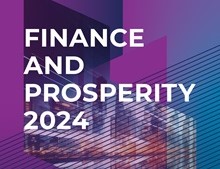Nearly 60 per cent of banks allocate less than 5 per cent of their lending to climate-related investments, while over 25 per cent do not offer any climate financing options at all in Emerging Market and Developing Economies (EMDEs).
A new World Bank report released yesterday described the limited climate financing of banks in developing economies as a significant concern, making them unlike in advanced economies where the financial sector is more diverse and resilient.
World Bank Senior Managing Director of Development Policy and Partnerships, Axel van Trotsenburg, emphasized that emerging market and developing economies require urgent climate action and private investment to address significant financing gaps in low-carbon, climate-resilient projects, particularly in countries with the greatest needs.
“Axel explained that this requires collective action, and the banking sector is indispensable in this transition process. “It can play a pivotal role in financing a green, low-carbon, and sustainable development path,” he said.
The World Bank's "Finance and Prosperity 2024" report, with a special focus on the Sovereign-Banks Nexus, Climate, and the Banking Sector, revealed that global banking authorities are exploring innovative approaches to boost climate financing while maintaining financial sector stability and promoting inclusion for underserved populations.
The report cited the adoption of green and sustainable taxonomies as a crucial step in increasing climate-related lending, as these classification systems help identify activities and investments that support environmental targets and promote sustainable development.
“Today they cover only 10% of EMDEs compared with 76 % of advanced economies,” the report said.
World Bank Vice President for Prosperity, Pablo Saavedra, stated that adaptation is underfunded, with only 16% of domestic and international climate finance in emerging markets and developing economies allocated for adaptation. He further noted that 98% of this small share comes from public resources or official financing.
Pablo emphasised that bridging the climate finance gap also necessitates the development of larger capital and insurance markets in developing economies, which would provide long-term funding for critical climate-resilient infrastructure, complementing increased climate lending from banks.
“It’s also important to improve financial access for people, particularly those in vulnerable groups,” Pablo said.
The inaugural "Finance and Prosperity 2024" Report, the first in an annual series, assesses financial sector developments and vulnerabilities in low- and middle-income countries.
The report revealed a concerning divergence in financial sector resilience and stability, with an analysis of 50 countries (representing 93% of total bank assets in Emerging Market and Developing Economies) showing that 30% of these countries face high financial-sector risks in the next 12 months.
It said most of these countries lack adequate policy frameworks and institutional capacity to address financial stability challenges.
The report highlighted another critical issue, saying domestic banks' excessive holdings of government debt, pose a significant risk to some economies, especially those with weaker macroeconomic policies and public debt sustainability challenges. It indicated that, between 2012 and 2023, banks' exposure to government debt increased by over 35%, further exacerbating this vulnerability.
Recommendations to strengthen bank buffers
The report provided recommendations for countries to bolster their financial resilience by strengthening bank buffers proactively, implementing financial safety nets, conducting regular stress tests, and establishing essential tools, including interagency crisis-management mechanisms, emergency liquidity assistance, robust bank resolution frameworks and adequately funded deposit insurance systems.
To further enhance financial stability, the report suggests that developing economies consider introducing disclosure requirements for banks' exposures to government debt to encourage more prudent risk-taking by banks and foster market discipline.
Latest Stories
-
Regulators of financial institutions urged to develop policy framework for climate financing
25 mins -
Akufo-Addo: New BoG HQ to enhance reform capacity and investment climate
42 mins -
DRIP initiative improves over 80km of roads in Greater Accra, says RCC
52 mins -
Akufo-Addo to commission over 80 educational projects today
53 mins -
Police to set up Election Task Force Briefing Centre for 2024 polls
54 mins -
AFCON 2025: GFA to apologise to Ghanaians for Black Stars failure
1 hour -
Justice Yonny Kulendi urges Accra Business School graduates to lead with integrity
1 hour -
Ghanaians confident in Mahama’s leadership – Joyce Bawah
1 hour -
GFA to decide Otto Addo’s future next week Wednesday
1 hour -
We’ll decide which party to support in December polls – PNC Chairman
2 hours -
Former President Agyekum Kufuor’s paradoxical support for Dr Bawumia and matters arising
2 hours -
We are yet to benefit from Planting for Food and Jobs Phase II – Rice farmers
3 hours -
Wendy Shay supports Manhean M/A Basic School on World Children’s Day
3 hours -
Omane Boamah assures NDC faithful of close monitoring of election material deployment
4 hours -
Police administration and Election Security Task Force ‘untried and untested’ – Dr. Agordzo
4 hours

